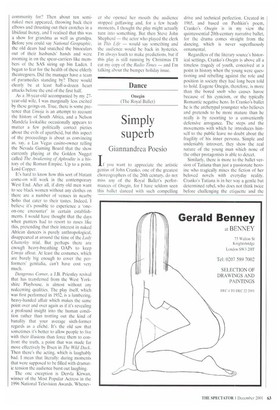Onegin (The Royal Ballet)
Simply superb
Giannandrea Poesio
If you want to appreciate the artistic genius of John Cranko, one of the greatest choreographers of the 20th century, do not miss any of the Royal Ballet's performances of Onegin, for I have seldom seen this ballet danced with such compelling drive and technical perfection. Created in 1965, and based on Pushkin's poem, Cranko's Onegin is in my view the quintessential 20th-century narrative ballet, for the drama comes straight from the dancing, which is never superfluously ornamental.
Regardless of the literary source's historical settings, Cranko's Onegin is above all a timeless tragedy of youth, conceived at a point in history when the young were questioning and rebelling against the role and position in society they had long been told to hold. Eugene Onegin, therefore, is more than the bored snob who causes havoc because of his cynicism, or the typically Romantic negative hero. In Cranko's ballet he is the archetypal youngster who believes and pretends to be more mature than he really is by resorting to a conveniently defensive arrogance. The steps and the movements with which he introduces himself to the public leave no doubt about the fragility of his inner persona. Simple and undeniably introvert, they show the real nature of the young man which none of the other protagonists is able to detect.
Similarly, there is more to the ballet version of Tatiana than just a passionate heroine who tragically mixes the fiction of her beloved novels with everyday reality. Cranko's Tatiana is in her way a gentle but determined rebel, who does not think twice before challenging the etiquette and the mores of her times, only to plunge into tragedy with the typical ardour of every teenager. Her dream duet with Onegin in the bedroom clearly goes beyond the boundaries of the infatuation that an innocent girl is supposed to have. And it is on this wild dream/nightmare that the whole drama hinges, more or less unconsciously.
Next to them Olga and Lenski might look less elaborate at first and more in line with the stereotypical ballet representation of a happy couple. Yet a brief but deep analysis of their movement vocabulary reveals more. Olga is not just a silly smiling goose, incapable of understanding when it is better to stop. Her intentionally flirtatious and dangerously flighty nature is highlighted from the very first step she takes on pointe. Lenski, too, is far more complex and far less amiable than he looks at first. His over-possessive, jealous nature, his way of considering Olga his own exclusive private property — feelings that will eventually lead to catastrophe — become gradually clearer and clearer through his dancing. By the time we reach that superb example of choreographic art known as `Lenski's death solo', his complex nature is displayed in full. Rather than an unhappy and unlucky romantic hero, he is an adorably irresponsible but spoiled brat, who can hardly face the idea of dying like a true gentleman. On the opening night, the quartet of protagonists was simply superb.
Tatiana is a more than ideal role for Tamara Rojo. Technically strong, and artistically intense, she knows how to capture and hold the viewer's attention. She might not move gradually from naive girl to mature woman, but she is certainly powerfully dramatic in the last scene, where she manages to convey like no one else the turmoil that accompanies her final resolution to cut any tie with her past.
Adam Cooper has come back to the Royal Ballet as a cumbersome, unusually sinister and slightly villainous Onegin. He might look a bit too lugubrious in the first two scenes, thus giving away too soon what will be coming next, but the dark shading he confers on his role helps him develop a seldom-seen psychological depth to the part.
Alina Cojocards Olga was simply splendid. Thanks to a breathtaking combination of superb technique and first-rate interpretation, the new Royal Ballet star made her character truly credible. As her fiancé, Ethan Stiefel gave us a memorable Lenski. Strong, stubborn and passionate, Stiefel's portrayal of Onegin's friend stood out because he was not played as the usual sugary fop, who expires like the proverbial dying swan. His death solo was an unexpected burst of young masculine desperation, which elicited many gasps of admiration from the audience.
The rest of the company danced superbly too, showing a perfect understanding of the stylistic requirements of the ballet. No serious balletomane should miss it.





















































































 Previous page
Previous page